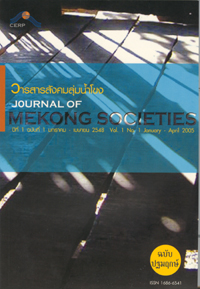Nguyen Huy Thiep’s Historical Short Story: A Challenge To Vietnamese Historiography In The Renovation Period
Main Article Content
Abstract
Vietnam’s literary movement in the late 1980s was an outcome of the economic and political reforms (Dôi Mói) that began in 1986 at the Sixth Party Congress. Nguyên V?n Linh, Secretary-General of the Communist Party in the mid-1980s, tried to move away from centralized control towards a market economy in order to rescue the country from economic crisis and political malaise. The Renovation Policy dramatically affected literary and cultural activity in Vietnam. Vietnamese writers took this opportunity to explore a wider range of new themes, experiment with new styles of writing and delineate objective truth. They also challenged readers to rethink and reinterpret what had happened in the past with new perspectives. This study will make a special reference to “Fired Gold,” Nguyên Huy Thiê⁄p’s historical short story and its significance as a challenge to Vietnamese historiography in the Renovation Period. The story was written by Nguyên Huy Thiê⁄p, probably the most successful writer during the Renovation Period. It reflects an attempt to re-examine Vietnamese history and is part of Nguyên Huy Thiêp’s historical trilogy. Nguyên Huy Thiêp’s works were widely discussed and he became a center of attention in journals and magazines in the late 1980s. This incident was later referred to as “the Nguyên Huy Thiê⁄p phenomenon.” The story is set in the 19th century, at the beginning of the Nguyên Dynasty. The author highlights two historical figures: the king Gia Long (Nguyên Anh), and the poet Nguyên Du. Nguyên Huy Thiêp’s portrayal of Gia Long and Nguyên Du is different from what is recorded in historical writings. Marxist historians often represented Gia Long as a national traitor who relied on the French troops for his own benefit. Meanwhile, Nguyên Du, who was often celebrated as national poet, is depicted in Nguyên Huy Thiê⁄p’s short story as a miserable young intellect tual, who was alienated from his countrymen. In short, Nguyên Huy Thiê⁄p, through this short story, presents 19th century Vietnam with a new perspective. The story is told from a foreigner’s point of view. This is probably the story’s most significant contribution. That is to say, it shows how “point of view” has played an important role in telling a story in fictional and historical writing. This leads to a question of how objective the official history is. “Fired Gold” also allows us to follow the development of history from individual perspectives. This is a major contrast to official history, which focuses more on historical and political events, and neglects individual sensitivity to social changes. -The short story “Fired Gold” brought about debates between Vietnamese historians and literary critics, especially the idea of fictional truth and historical truth and how far a writer can imagine history. This paper will chart the course of this debate and the wider discussion about the relationship between history and literature in Vietnamese society. The study will be divided into three main parts. First, it will provide a biographical sketch of Nguyên Huy Thiê⁄p and the socio-political context of the Renovation Period. The second part will deal with an analysis of the short story in terms of plot, characterization and narration. The final part will extend to the discussion and debates on the short story that dominated the Vietnamese literary sphere in the late 1980s. It is hoped that the study will contribute to an understanding of the interrelation between historiography, literature and state control in Vietna

